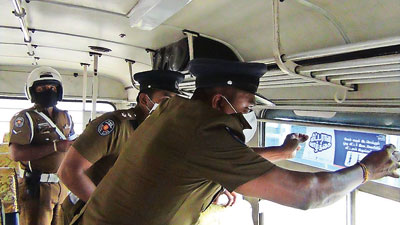News
Dicing with a deadly disease in the struggle of life
Some Sri Lankans have been seen in public ignoring the potentially deadly coronavirus in their midst despite the rapid spread of the disease and the desperate official efforts to contain its resurgence.

Police conducting awareness programme on public buses. Pic by Hiran Priyankara
Many are converging on pharmacies, public markets, grocery stores, supermarkets, bakeries, to stock up on essentials for their families, the sick and the seniors, often overlooking the danger around them, whenever curfew restrictions are eased.
Public health officials and the police have been on the streets making people aware of anti-epidemic regulations now gazetted.
The gazette notice includes health guidelines such as wearing of face masks and social distancing. Violators, if convicted, face a six month jail term, or a Rs 10,000 fine.
The gazette also empowers the authorities to restrict movements of people, send suspected coronavirus patients to hospitals, to a place of observation, or impose self-quarantine. Those in self-quarantine are not permitted to enter or leave, travel, or use transport to any public place. Even workplaces are instructed to limit the number of employees accordingly.
The Headquarters Inspector (HQI) in charge of Gampaha, Chief Inspector Saman Jayasinghe, told the Sunday Timesthat awareness programmes about regulations under the Quarantine and Prevention of Disease Ordinance, were continuing for a second week.

Chilaw: Little heed to COVID health guidelines as people flock to this wayside fish pola. Pic by Augustin Fernando
He said those breaching the rules would be warned and repeat offenders face legal consequences.
He also said the police were asking essential goods vendors to open their shops.
The HQI of Anuradhapura, C.I Sanjeewa Mahanama, said public awareness programmes were being undertaken.
He said the police had taken action against some drug addicts and drunkards seen on the streets.
Police check buses and make sure conductors and drivers avoid overcrowding.
The Jaffna police HQI, Prasad Fernando, said there were concerns about arresting suspects, who could be infected with the coronavirus.
So, suspects are being released after taking statements and recording personal information.
Mr Fernando explained that they too were carrying out public awareness programmes.
“On buses and vehicles, we pasted stickers, which contain information about social distancing and wearing of face masks,’’ he said.
There are times when police officers on the streets offer face masks to those who do not have them.
Senior Deputy Inspector General (DIG) in charge of Western Province, Deshabandu Tennakoon, said the police could now take legal action against those not complying because regulations had now been gazetted.
“However, we are currently not implementing the law strictly, as people are already facing difficulties. We will resort to imposing the law as a last resort,’’ he said
He said the people are being informed about the regulations and the police are only taking action against drug addicts and alcoholics on the streets.
“We have noted the information of 100 drug addicts and drug distributors from the Wattala area who had been moving about during the curfew. We plan to take legal action against them.”

